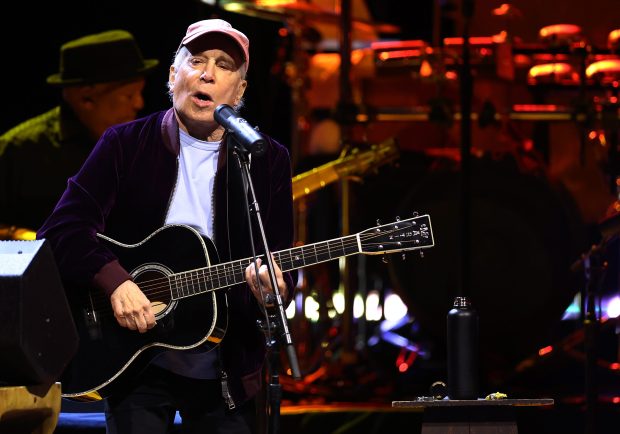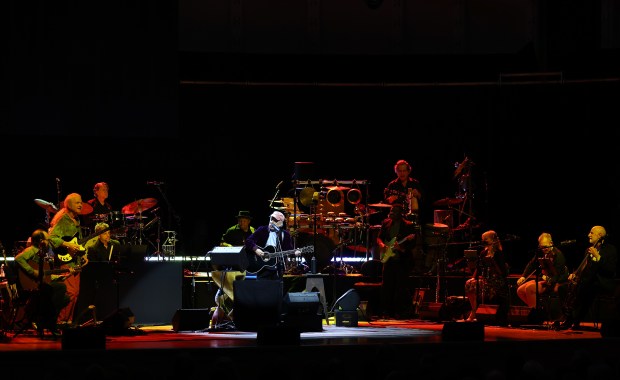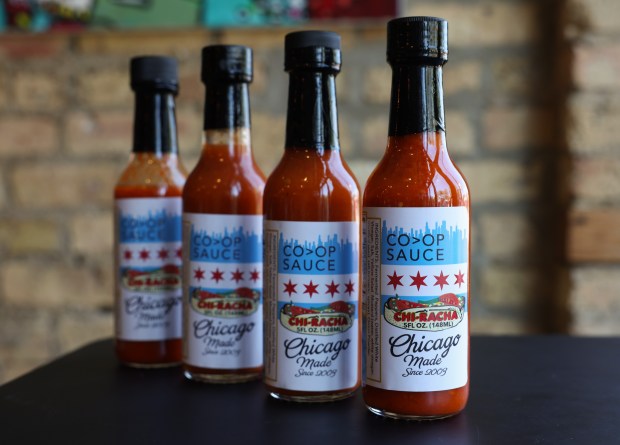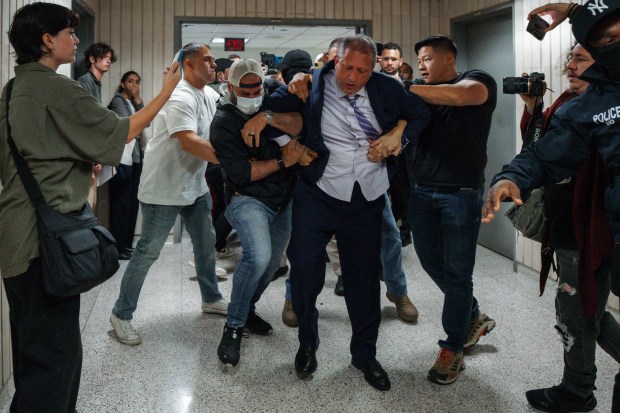“We are in a conversation,” a gracious Paul Simon announced Wednesday at the first of a three-night stand at Symphony Center, a proper location for his “Quiet Celebration” tour. And what a memorable conversation it was.
Opening the two-set concert with a full performance of “Seven Psalms,” his 2023 album comprised of a continuous suite of seven songs, Simon presented a fearless meditation on mystery, mortality and the great beyond. Those weighty topics extended beyond the potent “Seven Psalms.” They arose in almost all of the older selections he chose — work that took on new significance and intent given Simon’s current reflections, his 83-year-old age and diminished voice.
Though the iconic singer-songwriter never issued any overt statements linking the cerebral concepts of “Seven Psalms” to material he wrote decades ago, common threads about loss, wonder, home and the constant search for meaning informed the 115-minute show. Simon explored tensions between disbelief and faith, envisioned the Lord as both guardian and saboteur, and seldom arrived at definitive answers to his probing thoughts.
Seated on a stool with an acoustic guitar and surrounded by a semi-circle of 11 ace musicians, Simon delivered ruminations, deliberations and hymns via soft, deceivingly casual phrasings. Subtle hand gestures, spiritual tones and light rhythms emerged as undercurrents. Tranquil albeit unsettled, the nuanced approach represented the latest mutation of an artist for whom seeking adventure and rejecting stasis constitute career-long constants. The understatement suited his voice, which now demands that Simon play in intimate halls.
Robbed of its former range and projection, Simon’s once-flexible instrument displayed wear, thinness and frailty. Occasionally, it frayed and quivered, its raggedness somewhat concealed by the low volumes. Humble and sincere, Simon’s singing invited the crowd to lean in as if it took the form of a whisper sharing secrets — and to meet it on its own terms before the words dissolved, offering wisdom as the reward.
Under no circumstances would Simon’s present vocal abilities succeed in an arena environment. It’s also difficult to picture him pulling off the sort of greatest-hits routine typically dispatched by vintage artists catering to the whims of nostalgia. A number of his classic songs no longer fit the parameters of his voice and would probably suffer. He seems to understand that. Better still, he possesses the desire to find fresh ideas in the old and new. Particularly amid songs concerning death, mercy, eternity, and clarifying realizations that, if you’re lucky, strike you when you can still act upon them.
And so, on this evening, Simon skipped “Diamonds on the Soles of Her Shoes” and “Cecilia.” He bypassed the sure-fire favorites “Kodachrome” and “You Can Call Me Al.” Simon didn’t entirely ignore his carefree side. A bubbly “Me and Julio Down by the Schoolyard” preceded the encore, which began with the singer rhyming on “50 Ways to Leave Your Lover.” The tunes stood as exceptions amid a set that dared to go deep on multiple levels, with Simon saying several compositions were seldom performed live.
To hear him a few years ago, you would think his days on the stage were finished. The New Jersey native announced he would cease touring in early 2018, the same year he commemorated his legacy with a “Homeward Bound: A Farewell Tour” that included an acclaimed stop at United Center. Save the sporadic one-off appearance, he stayed true to his word. Then the creative bug bit.
Around the time he released “Seven Psalms,” Simon revealed in an interview that he suffered near-total hearing loss in his left ear. But, having again started to write songs, Simon felt an urge to play the album in front of audiences. Reversing a prior decision, he announced his current 56-date outing after appearing on the “Saturday Night Live 50th Anniversary” special in February.
Initially dressed in a sports coat and later donning a ballcap, Simon made himself small in the service of the music. His exceptional group — which included the final surviving original member of the “Graceland” band, bassist Bakithi Kumalo, plus multifaceted guitarists Gyan Riley and Mark Stewart — exhibited similar restraint and modesty. A rotating stable of woodwinds, strings, glass cloud-chamber bowls, shaken devices and xylophones complemented acoustic foundations built by guitars, pianos and percussion.
Mindful of potential overkill, or of drowning out Simon’s fragile voice, the collective let the arrangements breathe and valued the spaces between notes. With no one overstepping their boundaries and everyone serving the whole, the discipline and technique mirrored that of an orchestra. Ditto the classical-leaning fades and swells of the “Seven Psalms” pieces. They eschewed pop conventions and traveled in directions whose fluid, sidewinding motions evoked the surrealism and unpredictability of dreamscapes.
“Your Forgiveness” haunted with Spanish-style accents and pointed chords as Simon posited that humans are merely droplets in God’s massive universe. Aided by the smooth, soothing vocal harmonies of intermittent guest and Simon’s wife, Edie Brickell, “The Sacred Heart” drew from Biblical parables about refugees and place as it delved into empathy and the notion of music as a balm. The mantra “Love is Like a Braid” addressed doubt, transition, innocence and home.
They established thematic road maps for Simon’s earlier songs, with the welcoming messages of the plucky “Graceland” no longer confined to Memphis, Tennessee, but hinting at a peaceful destination not of this Earth — and affiliated with the beautiful heaven of “Wait.” Home, and lasting comfort, further figured in the nimble “Homeward Bound,” its connotations radically different from those of 60 years ago when Simon penned it as a road-weary folk singer traveling overseas. And they flickered in the detailed descriptions of the melodic “Spirit Voices.”
Enchantment, and the examination of factors outside our control, also instructed practical matters, whether the bedtime-lullaby episodes of “St. Judy’s Comet” or delightful scenes of the patient “Rene and Georgette Magritte with Their Dog After the War.” That deep cut circled back to Simon’s treatment of the passage of time and how it colors perspective, particularly when one looks back on what they cannot change and wish they knew long ago.
He imagined such luck in the foot-tapping “Rewrite,” the narrator’s yearning for a redo so desperate that Simon framed it as a pleading prayer. Other protagonists overlooking fortune in their pursuit of “the thought that life could be better” weren’t granted wishful fantasy, while the trio — R&B singer Johnny Ace, John F. Kennedy and John Lennon — chronicled in “The Late Great Johnny Ace” suffered a graver fate.

Emotions as heavy and definite as mortality hung over a finale that found Simon solo and alone, singing his most timeless song in a weather-beaten voice. Coming across as a farewell, “The Sound of Silence” chilled with its ostensible serenity, its observations about the lack of real communication and connections having evolved from urgent warnings to terrifying realities.
And like to the tired fighter in “The Boxer,” Simon still remained, his prescient lyrics echoing with deafening truths.
Bob Gendron is a freelance critic.
Setlist from Symphony Center in Chicago on May 21:
First set (“Seven Psalms”)
“The Lord”
“Love is Like a Braid”
“My Professional Opinion”
“Your Forgiveness”
“Trail of Volcanoes”
“The Sacred Harp”
“Wait”
Second set
“Graceland”
“Slip Slidin’ Away”
“Train in the Distance”
“Homeward Bound” (Simon and Garfunkel cover)
“The Late Great Johnny Ace”
“St. Judy’s Comet”
“Under African Skies”
“Rene and Georgette Magritte with Their Dog After the War”
“Rewrite”
“Spirit Voices”
“Mother and Child Reunion”
“Me and Julio Down by the Schoolyard”
Encore
“50 Ways to Leave Your Lover”
“The Boxer” (Simon and Garfunkel cover)
“The Sound of Silence” (Simon and Garfunkel cover)





